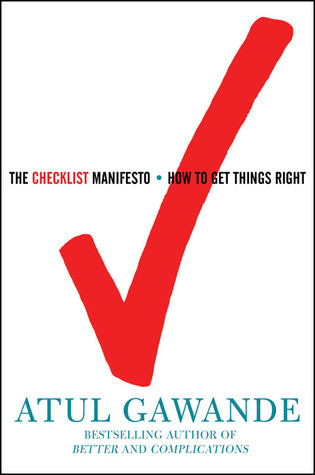The Checklist Manifesto by Atul Gawande was the first of sixteen non-fiction books that my friend Daniel was good enough to recommend. In addition to being an author, Gawande is a medical doctor and public health researcher. The Checklist Manifesto recounts his attempts working with the World Health Organization to decrease the number of preventable deaths and complications incurred during surgery. He makes a fairly compelling argument that basic checklists, thoughtfully crafted and diligently followed, can make a significant difference in the mortality rate and need for follow up care.

I'm someone that uses checklists extensively, so the author didn't have to do much to convince me of their utility. In addition to medicine, the book contains insights into construction and aeronautics. In both of those fields, there used to be masters who were knew and could personally oversee every detail involved in their professions. There came a time when the sheer amount of knowledge involved made it so this was no longer possible. No single person could know everything. So these fields have adapted checklists to make sure that everything that needs to happen is done regardless of whether the pilot or builder actually remembers that detail. I was in particular surprised to learn just how ubiquitous checklists are in flying. Apparently there's one for every conceivable emergency and pilots are trained to rely on them religiously.
This hasn't happened in the medical field. Gawande delves into a few reasons why this might be the case, but the egos of the doctors seem to be the most significant contributor. Despite the fact that the field of medicine has become specialized beyond belief (Gawande specializes in endocrine surgery) they seem unwilling to admit that they don't know everything or that they could need assistance from something as mundane as a checklist. It's also interesting to note that the checklists that Gawande sought to develop had an impact not just because they remind surgery teams to administer an antibiotic but because they shift the interpersonal dynamics. The lists require that each person participating introduce themselves and have a chance to express concerns. For people that have never worked together, this creates a closer team that can better respond to problems. It also creates the expectation that anyone, like nurses, can speak up if something is being done wrong (which seems to help regardless of checklists being involved).
I definitely enjoyed this book. I would recommend it, particularly to anyone interested in public health or management generally.

I'm someone that uses checklists extensively, so the author didn't have to do much to convince me of their utility. In addition to medicine, the book contains insights into construction and aeronautics. In both of those fields, there used to be masters who were knew and could personally oversee every detail involved in their professions. There came a time when the sheer amount of knowledge involved made it so this was no longer possible. No single person could know everything. So these fields have adapted checklists to make sure that everything that needs to happen is done regardless of whether the pilot or builder actually remembers that detail. I was in particular surprised to learn just how ubiquitous checklists are in flying. Apparently there's one for every conceivable emergency and pilots are trained to rely on them religiously.
This hasn't happened in the medical field. Gawande delves into a few reasons why this might be the case, but the egos of the doctors seem to be the most significant contributor. Despite the fact that the field of medicine has become specialized beyond belief (Gawande specializes in endocrine surgery) they seem unwilling to admit that they don't know everything or that they could need assistance from something as mundane as a checklist. It's also interesting to note that the checklists that Gawande sought to develop had an impact not just because they remind surgery teams to administer an antibiotic but because they shift the interpersonal dynamics. The lists require that each person participating introduce themselves and have a chance to express concerns. For people that have never worked together, this creates a closer team that can better respond to problems. It also creates the expectation that anyone, like nurses, can speak up if something is being done wrong (which seems to help regardless of checklists being involved).
I definitely enjoyed this book. I would recommend it, particularly to anyone interested in public health or management generally.
No comments:
New comments are not allowed.